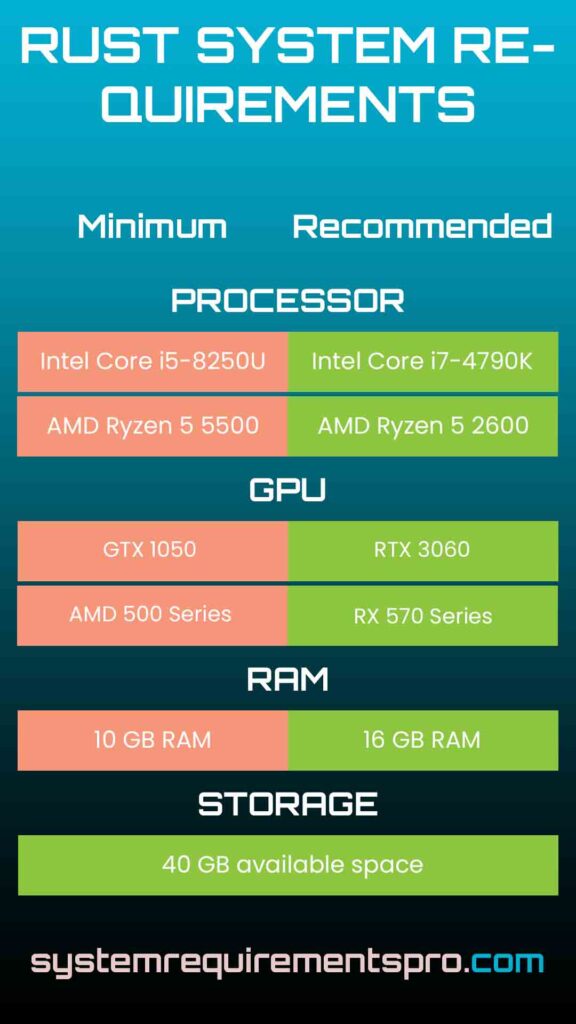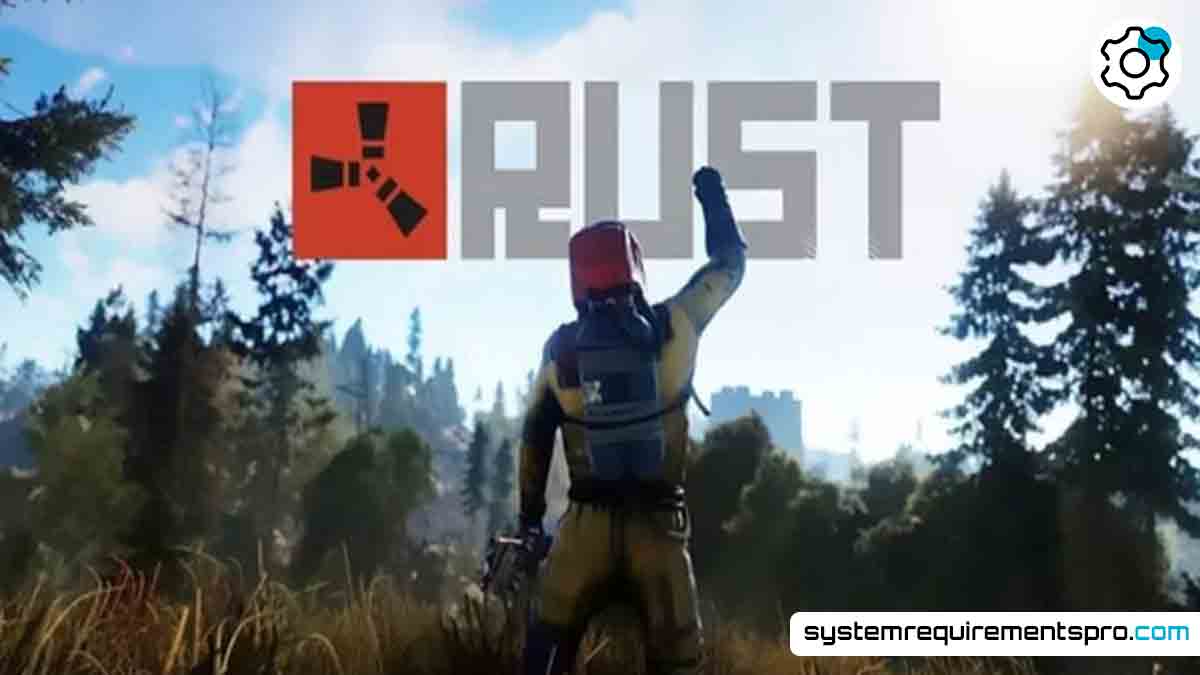Popular multiplayer survival game Rust is well-known for its demanding gameplay, realistic settings, and strong player interactions. Understanding the Rust System Requirements is essential for both experienced survivors and newcomers to guarantee seamless performance and a fun gaming experience. This guide compares the minimum and recommended specs, dissects their variations, and offers optimization advice to enable Rust to be most useful.
Rust Minimum System Requirements
Your PC needs to satisfy the minimum hardware and software requirements if you want Rust running on it. Though performance may vary depending on in-game events, these minimum system requirements enable the game to launch and run at reduced settings.
Minimum Requirements
- Operating System: Windows 8.1 64-bit or newer
- Processor: Intel Core i7-3770 / AMD FX-9590 or better
- Memory: 10 GB RAM
- Graphics: NVIDIA GTX 670 2GB / AMD Radeon HD 7870 2GB or equivalent
- Storage: 25 GB available space (SSD recommended for faster load times)
- DirectX: Version 11
- Network: Broadband internet connection
Meeting these requirements guarantees Rust can run, but during high-intensity events, such as raids or major player encounters, Rust may run with lower visual quality, longer loading times, or frame rate drops.
Rust Recommended System Requirements
Aim for the advised Rust system requirements for a consistently smooth experience with higher graphical fidelity. These specs serve players who wish to enjoy the game at medium to high settings without sacrificing performance.
Recommended Requirements
- Operating System: Windows 11 64-bit
- Processor: Intel Core i7-4790K / AMD Ryzen 5 1600 or better
- Memory: 16 GB RAM
- Graphics: NVIDIA GTX 980 Ti / AMD R9 Fury 4GB or equivalent
- Storage: 25 GB available space (SSD strongly recommended)
- DirectX: Version 12
- Network: Stable broadband connection
Rust runs perfectly at 60 FPS or above with these specs, even on heavily crowded servers or during graphically demanding events like explosions. Improved textures, shadows, and draw distances help players to enter the brutal, post-apocalyptic environment of the game.

Rust System Requirements PC: Minimum vs Recommended
Choosing between the minimum and recommended Rust system requirements depends on your hardware and performance expectations. Below is a detailed comparison:
| Category | Minimum Requirements | Recommended Requirements |
|---|---|---|
| OS Requirements | Windows 8.1 64-bit | Windows 11 64-bit |
| CPU Requirements | Intel Core i7-3770 / AMD FX-9590 | Intel Core i7-4790K / AMD Ryzen 5 1600 |
| RAM Requirements | 10 GB | 16 GB |
| GPU Requirements | NVIDIA GTX 670 / AMD HD 7870 | NVIDIA GTX 980 Ti / AMD R9 Fury |
| Storage Requirements | 25 GB HDD/SSD | 25 GB SSD |
Key Differences:
- CPU: Better at multitasking, less lag during complex calculations.
- RAM: 16 GB for smoother gameplay when running background apps.
- GPU: Stronger for faster rendering and more details.
- Storage: SSD for faster load times and a competitive edge.
Mid-range systems can tweak settings to balance performance and visuals, but meeting recommended specs means consistent high quality.
Optimization Tips for the Rust Game
Even if your PC meets the Rust system requirements, you can still optimize:
- Update Drivers: Make sure your GPU and CPU drivers are updated for compatibility and performance.
- In-Game Settings: Lower shadow quality, draw distance, and texture resolution to boost FPS.
- Close Background Apps: Free up RAM by closing unnecessary apps like browsers or streaming software.
- SSD: Install Rust on an SSD to reduce load times and stuttering.
- Monitor Performance: Tools like MSI Afterburner to track FPS, CPU/GPU usage, and temperatures.
- Server Selection: Choose servers with lower ping and population to reduce network strain.
Conclusion
Maximizing your gameplay requires a knowledge of the Rust system requirements. Although the minimum specs let you run the game, the recommended specs provide a more aesthetically pleasing experience. Whether you’re resource-scrounging or defending your base from competitors, following the optimization guidelines above will help you customize Rust’s performance to fit your hardware.
Frequently Asked Questions
Can Rust run on a low-end PC?
Yes, if you meet the minimum requirements. But expect lower fps and longer load times.
What’s the difference between minimum and recommended requirements?
Minimum specs will get the game to run at basic settings, recommended specs will get you higher fps and better visuals.
Does internet speed affect Rust performance?
A stable connection reduces latency, which is important for multiplayer but doesn’t affect graphics.
Should I upgrade my RAM for Rust?
16GB RAM will help with multitasking and reduce stuttering in busy areas.
Can I play Rust on a laptop?
Yes, if your laptop meets the minimum/recommended specs. Make sure to have proper cooling to avoid thermal throttling.
We hope that you have found the answer to the system requirements for Rust. Follow System Requirements Pro for more such updates, and bookmark this page to get the latest updates on the system requirements for Rust.

